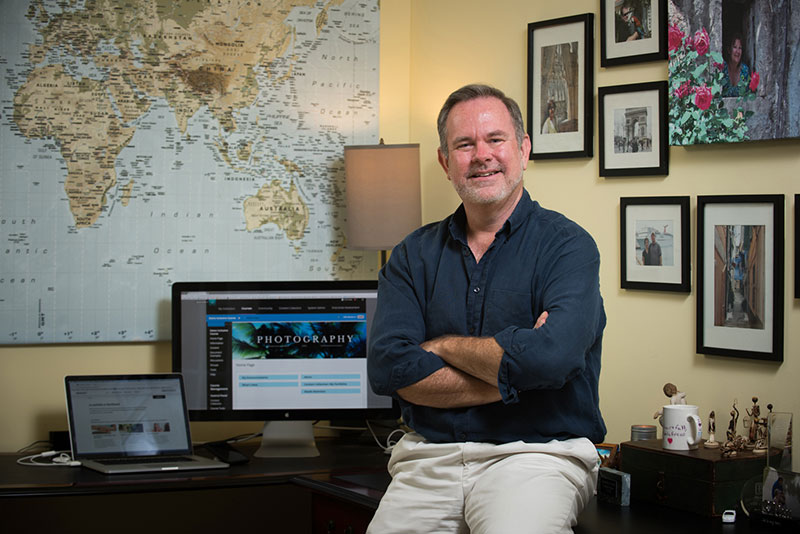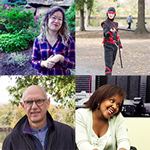Faces Behind the Screen: Scott Ready
Quick Links
<< Return to all “Faces Behind the Screen” stories
We had the pleasure of sitting down with Scott Ready, the Director of Customer Relations & Accessibility Strategist at Blackboard, at the 32nd CSUN Assistive Technology Conference.
Scott was raised by Deaf parents and – really – by the Deaf community. Having grown up on the campus of the Missouri School for the Deaf, Scott – a hearing child – learned American Sign Language (ASL) as his first language.
Scott brings a passionate and unique perspective to our Faces Behind the Screen project. He has dedicated his entire adult life to improving access to communication technology, and his love for the Deaf community he was raised by is clear to this day.
So Scott, what is your connection to the Deaf and hard-of-hearing community?
SCOTT: My parents are both deaf. And they were both instructors at the Missouri School for the Deaf. So what that meant is that while they were teaching, we actually lived on campus.
And so from the age of three I lived on the campus of the Missouri School for the Deaf, and my friends were the deaf kids, all my parents’ friends, and then other CODA kids. Now, CODA is a Child Of Deaf Adults, so C-O-D-A.
And so that was my community, and ASL was my first language. English is actually a second language for me.
“My parents are both deaf, […] and ASL was my first language.”
When did you learn English?
SCOTT: [We] didn’t use it predominantly in the household. My mom became deaf at two, so her language was American Sign Language. And so I gravitated towards ASL more than I did English as a first language. I had a principal of the elementary school there at the School for the Deaf who was hearing. And she would teach me speech because there was things– like I’d call a refrigerator a “refrecter” because that’s how Mom calls it. It was a “refrecter.”
And so she would help me correct that and pronounce it correctly. And interestingly enough, with the language, most people don’t realize that English is the second language for me because you don’t detect it through my presentations or just by talking with me.
But when I go to write, that’s where it really shows. Even today.
How so?
SCOTT: Structure wise, the grammar that I use when I write. In grad school I had an interesting story where a professor called me to his office. On the paper it said, come see me.
That’s the worst thing in grad school. You don’t what your professor to say come see me. So I went to his office and sat down. He said, I’ve just got a question. I read your paper, and it was very good content. But your structure is like my international students’. And I think you’re an American. And I said, yeah, I am. And he said, so can you help me understand the structure here? And I said, oh, OK, sure. I’d be glad to.
So it was interesting that he made that connection between my writing and the international students’, which was, again, another confirmation that ASL is a foreign language. And it manifests itself in a writing format that is comparable to other individuals that have other first languages other than English.
“It was interesting that he made that connection between my writing and the international students’, which was, again, another confirmation that ASL is a foreign language.”
Do you mind if I ask which language you prefer speaking?
SCOTT: I prefer ASL. I really do.
I can just express myself so much more in ASL than I can in English. It still– cognitively, ASL still is what I think through, language-wise. And then formulate it out into English.
Did you ever feel like at such a young age, translating for adults, that you were exposed to ideas and concepts that you just didn’t understand? Or did you have to learn really elaborate and complex ideas at a younger age because you were translating them?
SCOTT: Exactly. How many 10-year-olds go to a closing on a house?
Yeah. So while my parents are buying land and building a house and closing on it, I’m in all the negotiations, interpreting all of that. Now, my father always made all the decisions. I didn’t make decisions.
But I was involved in that negotiation process. I was involved in seeing, being exposed to all of those kinds of life situations at a very young age, which really gave me an advantage as an adult, because what I had learned and experienced growing up was much more than a typical child would.
“I was involved in seeing, being exposed to all of those kinds of life situations at a very young age.”
Of course. And did you find that with media that you had to translate the news and things that were happening in the world that maybe a child wouldn’t otherwise be exposed to?
SCOTT: In our family we had a footstool that would sit by the TV, and that was the interpreter’s footstool because we didn’t have closed captioning back then.
Growing up there was the Vietnam War, and so that being the first war that was really televised.
So I would sit on the footstool next to the TV and interpret the news and update Mom and Dad. Because they could read the paper, but the paper wasn’t as current as the TV news. So if you wanted current, up-to-date information, the TV was the best source. We didn’t have the internet, so we couldn’t Google it. We couldn’t get news feeds through our phone or through our computer at that time. So the TV was our only source.
“In our family we had a footstool that would sit by the TV, and that was the interpreter’s footstool because we didn’t have closed captioning back then.”
How do you feel that that experience changed your perception of the world?
SCOTT: Mhm. It made me more aware of what was taking place. Oftentimes, kids growing up, the news? That’s boring. I’m not going to pay attention to that. But because I was interpreting it– and I’m not saying that I always enjoyed doing it.
[LAUGHTER]No kid does.
And how do you feel like your experience growing up in the deaf and hard-of-hearing community has translated into what you do now?
SCOTT: Great question. I’ve been with Blackboard now– it’s going on my 13th year. Prior to that, pretty much every career position I’ve had has to do something with accessibility. Have it be a relay system– so in 1989, we set up the Kansas Relay Center, which was before the Americans with Disabilities Act. And so we were the 10th state to establish a relay center. And just having the opportunity to go through that whole process, working with the governor’s office, working with all the legislators in the state, and working with telephone companies, putting out that RFP, flying to California for– because California, Alabama– there were only a few other states that had relay centers.
Being able to provide that kind of telephone access was incredible, because most of a deaf person’s life prior to relay was if they wanted to make an appointment to get their hair cut, they had to physically go to the location, make the appointment for next week, and then go back home. They couldn’t just call up and make an appointment.
So that’s how all my careers have been– have been milestones like that, that I feel like I’ve had an opportunity throughout my life to really make impacts in different ways in accessibility.
“I feel like I’ve had an opportunity throughout my life to really make impacts in different ways in accessibility.”
Is there anything that you feel like you want the hearing community to know about the deaf community?
SCOTT: Deaf individuals can do absolutely anything except for hear. And I love that quote from I. King Jordan. So much of the time, the community puts limitations on individuals of all abilities, and they have stereotypes.
You wouldn’t believe some of the questions I’ve been asked about your parents are deaf, and you’re not deaf? Well, yeah. Your parents can drive? Well, yeah. Yeah, your parents had children?
Yeah, just unbelievable questions. And being the smartass that I am, sometimes I go back and I say, well, you know, I’ve never used my ear for that, but–
[LAUGHTER]Sometimes I like to throw just a little bit of a shocker. And they kind of go, oh, I guess not.
[LAUGHTER]But just to be able to look at the individual and understand that, yeah, maybe they approach the world a little differently. Maybe they communicate a little differently. That doesn’t mean they can’t do it. They can do absolutely anything. And you think about deaf lawyers, deaf doctors, deaf pilots.
There are ways to work around not being able to hear. So the greatest thing that we can do is to continue to educate.
—
Want more inspiring stories like Scott’s? Check out our storytelling project, Faces Behind the Screen.
Faces Behind the Screen is a storytelling project focusing on members of the Deaf and hard of hearing community.





